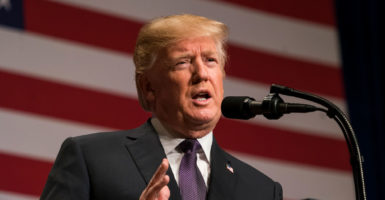Federal rulemaking slowed dramatically in 2017, with the Trump administration issuing two-thirds fewer regulations in its first year (1,136) than both Presidents Barack Obama (3,356) and George W. Bush (3,927).
The White House has also committed federal agencies to more than 400 deregulatory actions in 2018.
Here are 10 of the past year’s most consequential actions to rein in the regulatory excesses of previous administrations.
1. Clean Power Plan.
At an estimated annual cost of $7.2 billion, the Clean Power Plan was the centerpiece of the Obama administration’s global warming crusade. The Environmental Protection Agency on Oct. 16 published its proposed repeal of the regulation on the grounds that the rulemaking exceeded the agency’s statutory authority.
Beyond the avoided compliance costs, the repeal would reset limits on the EPA’s climate-related regulatory excesses.
2. Net Neutrality.
The 2015 “net neutrality” rule, formally titled the Open Internet Order, subjected internet service providers to antiquated regulation by the Federal Communications Commission. The order was reversed on Dec. 14 by a commission vote of 3-2.
3. Utilizing the Congressional Review Act.
The White House and Congress have exercised the Congressional Review Act to rescind 15 regulations in the past 12 months. Although enacted in 1996, the law had only been successfully used once before, in March 2001.
Among the most deserving of repeal: the Consumer Financial Protection Bureau’s ill-conceived ban on mandatory arbitration clauses in credit contracts to resolve disputes.
4. Waters of the United States.
This rule, jointly issued by the EPA and the U.S. Army Corps of Engineers, created a new definition for the waters that the federal government can regulate under the Clean Water Act. The definition tramples property rights and overrides the role of states in water stewardship.
The agencies are proposing to delay implementation for two years, during which time officials would reconsider the definition.
5. Sue and Settle.
EPA Administrator Scott Pruitt announced in October that his agency would no longer engage in the sham legal settlements frequently negotiated by the Obama administration.
The practice involved the EPA encouraging lawsuits by environmental lobbyists to force rulemaking or enforcement action. The agency would privately strike a generous settlement, with the plaintiffs heavily involved in the rulemaking and the public excluded.
Similarly, Attorney General Jeff Sessions on June 5 ended the Obama administration’s practice of funneling billions of dollars in settlement funds to left-wing allies.
6. Neomi Rao at Office of Information and Regulatory Affairs.
President Donald Trump in April nominated Neomi Rao to be the administrator of the Office of Information and Regulatory Affairs. This office plays a critical role in fulfilling the president’s regulatory agenda by reviewing proposed and final regulations, managing agency requests for information collection, and overseeing data quality government-wide.
Among her many professional affiliations, Rao founded and directed the Center for the Study of the Administrative State at George Mason University’s Antonin Scalia Law School. Only months into her new position, Rao has demonstrated the fortitude necessary to rein in the regulatory state.
7. Transgender Bathrooms.
Early in 2017, the Trump administration revoked the “guidance” issued by the Obama administration’s departments of Justice and Education specifying that transgender students have the right to use public restrooms that match their gender identity. The original directive injected the federal government into matters more properly addressed by states and local school districts.
8. Fiduciary Rule.
The president in February issued a Memorandum on Fiduciary Duty Rule, which directed the secretary of labor to determine whether the Department of Labor’s Fiduciary Rule would adversely affect access to financial advice.
The Labor Department in November delayed the rule until July 1, 2019, “because of its concern that … consumers may face significant confusion, and regulated parties may incur undue expense to comply with conditions or requirements that the department ultimately determines to revise or repeal.
9. Individual Mandate.
The recently enacted tax reform legislation abolished the financial penalties associated with the Affordable Care Act, which forced Americans to purchase health insurance coverage or be fined.
10. Paperwork Reduction.
The White House in August stayed an Obama administration rule that would have required businesses with 100 or more employees to report on what they pay employees by job category, sex, race, and ethnicity.
Employers already submit wage data for some 130 different categories, and the new rule would have increased the reporting volume to 3,300 categories.
Reform is difficult to accomplish because regulation is far more than policy. It is also a political spoils system by which various special-interest groups impose their will on the public. Thus, powerful forces favor the status quo.
Beyond the numbers, however, there is no question that there has been a fundamental—and welcome—shift in regulatory policy under Trump.


























